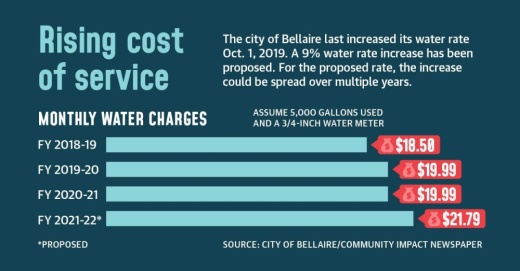The first involves recommendations from a recently completed user fee study that was first approved in December 2019 but delayed multiple times because of the COVID-19 pandemic. If the recommendations are approved, residents could see increases in a variety of city fees, including recreation and water meter fees, and building fees.
pandemic. If the recommendations are approved, residents could see increases in a variety of city fees, including recreation, water meter fees and building fees.
The second zeroes in on the city’s water rate, for which officials are recommending a 9% increase along with 7% increases in wastewater and solid waste rates.
How to go about the two items ultimately lies with the City Council, Mayor Andrew Friedberg said. Data will be key to the discussion, he said.
“Getting a handle on the extent to which taxpayers are subsidizing fee-supported services is a policy question for the City Council to decide, but the City Council is ill equipped to decide it without good data,” he said.
A more accurate picture

The $35,000 cost allocation plan and user fee study were two separate pieces of work performed over several months—both by Matrix Consulting Group, the Bellaire-hired independent accounting firm. They were rolled into one report that was presented to the City Council on July 19.
According to Bellaire Chief Financial Officer Terrence Beaman, the cost allocation work documented indirect costs associated with citywide services provided by departments within the general fund, such as human resources.
“It takes a look at all of the different departments and says, ‘Do you support internal functions, do you support external functions, or are you a combination of both?’” said Courtney Ramos, Matrix Consulting Group vice president, who worked on the Bellaire study.
Meanwhile, the user fee work identified direct costs specific to a particular city service, such as administering building and planning permits, and parks and recreation.
With those indirect and direct costs in hand, the firm was able to calculate a more accurate cost of service for a particular department, Ramos said.
The study showed Bellaire is not recovering enough in fees to cover what the city is paying for fee-related services. When comparing FY 2019-20 revenue to FY 2021-22 annual costs, Matrix Consulting estimated $4.2 million in losses.
Bellaire, like other municipalities that Matrix Consulting has worked with, did not show a clear documented process in how fees were determined prior to the onset of the study, Ramos said. Going back several years, city officials were unable to recall if they had ever performed a user fee-like study.
Bellaire City Council must now decide on how or if those costs should be further passed along to residents through user fees. In its proposed cost recovery goals for five city departments, study recommendations would increase revenue by $1.09 million.
However, should the City Council not approve the recommendations, Bellaire would still have the needed materials for more accurate future fees, Friedberg said.
“One of the deliverables is a proprietary model that the staff can then maintain on an annual basis in house,” he said. “We wouldn’t have to do a new fee study every single year.”

Trickle-down effect
Bellaire residents face increases in their utility rate for two main reasons: a study-recommended increase in an enterprise-to-general fund annual transfer and city of Houston water rate increases effective Sept. 1.
While the Matrix Consulting study did not specifically analyze Bellaire’s water rates, it did take a look at the city’s enterprise fund, used to support water distribution and production as well as wastewater collection and treatment, and solid waste services. Over 50% of this fund is paid by water bills, almost $5 million in revenue, according to a FY 2021-22 budget brief.

Bellaire transfers $624,000 each year from this fund into the city’s general fund to pay for handling utility billing needs. This comes from financial policies City Council adopted in 2015 that do not allow Bellaire to subsidize its enterprise fund with its general fund, Beaman said.
The Matrix Consulting study found $1.072 million, not $624,000, was needed to adequately pay for these support costs. Because utility bills significantly support the enterprise fund, an increase in the money needed for that fund necessitates an increase in fees, Beaman said.
As a result, city staff has recommended a 9% water rate increase for residents and 7% increases in wastewater and solid waste rates. This means a resident using 5,000 gallons of water and wastewater would see a monthly bill increase from $67.15 to $72.25.
The proposed rate increases would not only cover the increased transfer, but also ongoing water rate increases by the city of Houston, from which Bellaire purchases about half of its surface water supply, Beaman said.
The city of Houston approved its water rate increase June 23 and estimates a Houston resident using 3,000 gallons would pay $31.46 starting Sept. 1 and $37.18 starting April 2022.
Future decisions
What remains unknown is if the Bellaire City Council will ultimately approve increases in the utility rates and, if so, if they would spread out the increase over multiple years or increase it all at once.
What is clear is—at least for Friedberg and Council Member Jim Hotze—there is a desire to lower the effect on residents as much as possible.
They both support using the extra money being transferred into the general fund to provide property tax relief.
“I may be paying more on my water bill, but my taxes will not go up by the same amount,” Hotze said. “We want to have a net-zero effect so that people that are in a townhouse that doesn’t use any water aren’t paying more money than they should be.”
Another decision point for Bellaire City Council is on how it wants to handle the departmental cost recovery recommendations in the study.
For example, during its Aug. 16 meeting, the council came to a consensus to not only use the study’s recommendations as a baseline for future budget discussions, but also aim for 50%, instead of a proposed 40%, as a recovery goal for Bellaire Fire Emergency Management Services.
In the coming weeks, the council will weigh subsidization.
“How much should a non-user be subsidizing those that do use a particular service?” Friedberg said.





